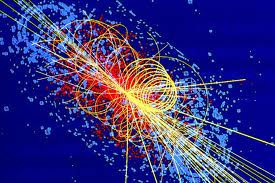Higgs Boson: a God Particle?
- Jason Song

- Dec 4, 2018
- 2 min read
Updated: Dec 9, 2018
Why is this sub-atomic particle that gives mass to particles called a God-particle? Because some people think that boson will explain the Big Bang Theory and perhaps even what happened before the "Big Bang" (see CNN’s discussion with Michio Kaku, a Physics Professor at CUNY; also Kaku himself at https://youtu.be/cNygv13-CkI). [Disclaimer: the points I make here are NOT directed at Professor Kaku himself; while I am not sure about his religious stance, he seems to acknowledge that there is a "god" out there who orchestrated the whole universe or many universes.]

I have three thoughts: (1) even if ALL the subatomic particles are discovered, that will necessitate the discovery of SUB-SUB-atomic particles (btw, we haven't even discovered all the particles...the Periodic Table is just what we know about the primary characteristics and tendencies of known/discovered elements); (2) Big Bang Theory is what it is--a theory: internally consistent yet FALSIFIABLE set of statements; if BBT is disproved, that does not necessarily mean God doesn't exist;
and (3) even if we can explain the PROCESS of Big Bang or HOW God created light or matter or space or time, that still leaves the fundamental questions unanswered: who is God, why was the universe created in the first place, what happens after death, etc.
Yes, discovering sub-particles will certainly affect some parts of our lives—as the discovery of nucleus has changed our world in the past 100 years. However, I disagree with Kaku that a “God-particle” has been discovered or, as some suggest, that that discovery will make God obsolete.
Interestingly, why must the scientific community consistently posit that God must be “disproved,” or relegated to “mother nature” or some predetermined processes? I am all for pursuing knowledge. But, why not let the facts speak for themselves rather than pegging them to fit only certain, favored theories? And, if this is the best anyone can do (scientists, atheists, and people of religious orientation), then at least admit that, (1) science cannot answer philosophical, moral, or ethical questions; (2) scientific community should not pretend that its assumptions are always based on verifiable facts (since scientists do much of their thinking and talking in terms of theories, not laws), and (3) most scientists have intentionally and systematically dismissed significant scientific discoveries supporting Teleological Argument in biology, physics, chemistry, and cosmology.
The scientific community represented by atheists must end the pretense of neutrality and stop the charade: scientists are not entitled to a special authority to dismiss discoveries that do not fit their worldview (their own beliefs or assumptions).
Let's all agree to go where the evidence leads. Let the facts and findings be weighed by their merit. Keep in mind academic titles and positions do not necessarily make arguments objective or neutral.






Comments